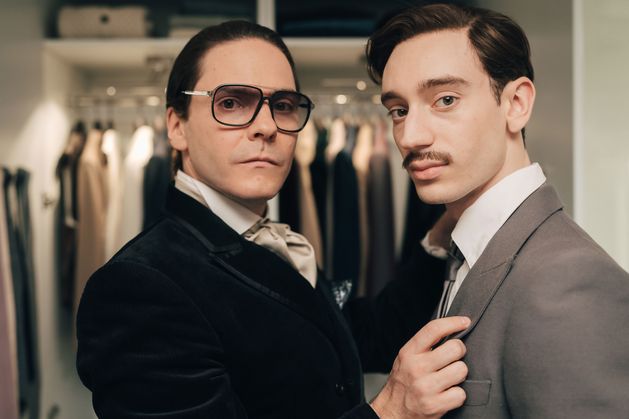Disney’s take on the German designer’s tortured relationship captures the glamour and snobbery of the Paris fashion scene in the 70s
Most of it is in French (with some German and a smattering of English and Italian), so you have to go with the subtitles. All in all, not a very encouraging start to a series about a fashion designer whose clothes you could never afford.
But over its six 40-minute episodes, Becoming Karl Lagerfeld got me. That was due to the acting from the two leads, Daniel Brühl as Lagerfeld and Théodore Pellerin as Jacques de Bascher, the young man who pursues Lagerfeld and enters into a tortured relationship with him.
Brühl has a very tough part, as a Lagerfeld who doesn’t drink, doesn’t smoke and doesn’t like anybody touching him. All of these characteristics set him somewhat apart in the Paris of the 1970s: it’s all scarves and smoking as far as I can see.
But Karl, although he wears a lot of brooches, is so emotionally repressed that he can’t have a good time unless he’s working, working, working. He lives with his mother Elisabeth (Lisa Kreuzer) because “she is funnier than anyone else,” and it is true, she is fantastic.
He is haunted by the success of his contemporary and old friend, Yves Saint Laurent. When the disappointments and humiliations get too much for him, he goes home, puts on one of his ravishing kimonos and stuffs himself with cake. So he is relatable in that way. The sight of Karl eating cake and weeping at the same time is — strange to say — a masterclass in acting by Brühl.
Pellerin, who is French-Canadian, is also terrific as the charming but rudderless Jacques. His wealthy Catholic family owns a vineyard. His good looks bring him a lot of attention on the gay scene, but his love for Karl defeats him because Karl is not only what we would now call a commitment phobe with intimacy issues, but permanently unavailable because of his work. He does, however, pay all of Jacques’ bills: that’s rent, clothes, records and, crucially, drugs.
Becoming Karl Lagerfeld does not have much about women in it. As Karl tells Jacques early on: “Fashion isn’t about women.” Fashion is about anticipating and encapsulating the future, according to him.
Affair: Jacques de Bascher (Théodore Pellerin) and Yves Saint Lauren (Arnaud Valois) in Becoming Karl Lagerfeld
The drama is set in a world where the fashion industry itself is vital to France. There is a sort of crisis when a young pretender, Thierry Mugler, appears a little too disrespectful of its old structures. French fashion, way back then, had its own codes, and boards, and authority figures and very strict rules. All of which Karl is trying to circumnavigate as he claws his way to the top. However, the most beautiful clothes are reserved for the men.
Jacques is the prettiest thing here. He soon hooks up with Yves Saint Laurent in order, we are led to believe, to annoy Karl. Which it does, very much. There is a great villain here too, in Pierre Bergé, Saint Laurent’s lover, manager and fixer. He has his work cut out for him with a fragile protégé who was famously said — possibly by himself — to have been born with a nervous breakdown.
So this is a very limited world, with a lot of agony and turmoil within it. But it is approached with French seriousness.
Despite the gloriousness of the houses and the forests of flowers and the glamour of the customers (although the episode with Marlene Dietrich is the least successful), this is a simple and tragic tale. Karl hurtles through the 1970s and’ 80s accumulating the accessories that would later make him famous: the fan, the ponytail, the knee-high boots. But at its heart, it is a look at two people who have everything to make each other happy, and manage to make each other wretched instead.
It is intelligent and well made. How accurate it can claim to be is another matter. But it does remind us how oppressive things were in those years for gay people. And how tough it was to be to be a gay man who is not young or slim or handsome.
It is really Karl’s sense that he is an outsider in every area of his life that drives him. He is a German in a Paris that still remembers the Occupation. His little bows, his formality and his iron reserve all mark him out as different. “Nobody likes me,” he shouts at Jacques during one of their surprisingly rare rows. He’s been working for 20 years to be accepted.
This is hard to reconcile with our vision of the Karl Lagerfeld of his later years, when he had Claudia Schiffer on one arm and Linda Evangelista on the other, with all three devoted to bombarding the world with Chanel. Becoming Karl Lagerfeld shows us the man before he was sandblasted with fame. He wanted it so desperately, he had to make his own fame. And he made it in ordinary offices, plotting and scheming tirelessly behind the scenes.

